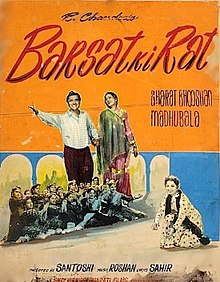Barsaat Ki Raat
| Barsat Ki Rat | |
|---|---|
 Theatrical release poster | |
| Directed by | P. L. Santoshi |
| Screenplay by | P. L. Santoshi |
| Produced by | R. Chandra |
| Starring | Madhubala Bharat Bhushan Shyama Mumtaz Begum K. N. Singh |
| Music by | Roshan Sahir Ludhianvi (lyrics) |
Release date | 9 December 1960 |
Running time | 142 min. |
| Language | Hindi |
| Box office | est. ₹3.5 crore (est. ₹701 crore as of 2016) |
Barsaat Ki Raat (transl. A Rainy Night), sometimes written as Barsat Ki Rat is a 1960 Bollywood film directed by Pyarelal Santoshi, starring Bharat Bhushan, Madhubala and Shyama in lead roles. It was produced by R. Chandra and revolves around Amaan and Shabnam, who elope and run away from their houses when latter's parents disapprove of them. When they try to start a new life in a new city, their past catches up.
This film was released in black-and-white on 9 December 1960. It became particularly popular for its qawwali songs and was a box office success. This was music director Roshan's biggest musical success; all the film songs became extremely popular. Barsaat Ki Raat was also one of the last films to star celebrated actress Madhubala.
Themes
The story features a number of innovative themes while maintaining the basic form of a love story. It has particularly strong female characters who are independent-minded and choose their own loves and destiny. Conflicts are not so much between the wishes of the parents and children about whom the children will marry, as is a common theme in Indian movies, but on the more complex level of conflicts among the main characters and the duplicitous signals men and women send each other. The movie glorifies the lives of "singing girls" not often regarded highly in Indian society. Although it is set with Muslim characters, the movie seamlessly shows the universality of sensual love.
Synopsis
This section is empty. You can help by adding to it. (March 2020) |
Cast
- Madhubala as Shabnam
- Shyama as Shama
- Ratna Bhushan as Shabab, Shama's sister
- Bharat Bhushan as Amaan Hyderabadi
- K. N. Singh as Inspector Khan Bahadur, Shanam's father
- Mumtaz Begum as Shabnam's mother, Bahadur's wife
- Chandrashekhar as Inspector Shekhar, Amaan's friend-turned-foe
- Baby Shobha as Razia, Shabnam's little sister
- Peace Kanwal as Barrister Aftab Ahmad
Soundtrack
The soundtrack of Barsaat Ki Raat was composed by Roshan, and lyrics were penned by Sahir Ludhianavi. It was the second best-selling soundtrack of 1960, after Mughal-e-Azam. The soundtrack features three qawwalis, and these qawwalis were one of the major reasons of film's success. Rediff.com, calling the film's music its lifeline, had placed "Na To Karavan Ki Talash Hai" at the second place in the "Bollywood's Top 10 qawwalis."[1]
| # | Song | Singer |
|---|---|---|
| 1 | "Maine Shayad Tumhe Pehle Bhi Kahin Dekha Hai" | Mohammed Rafi |
| 2 | "Maayus To Hoon Vaade Se Tere" | Mohammed Rafi |
| 3 | "Zindagi Bhar Nahin Bhoolegi" (Solo) | Mohammed Rafi |
| 4 | "Zindagi Bhar Nahin Bhoolegi" (Duet) | Lata Mangeshkar, Mohammed Rafi |
| 5 | "Mujhe Mil Gaya Bahaana Teri Deed Ka" | Lata Mangeshkar |
| 6 | "Na To Karvan Ki Talash Hai" (Yeh Ishq Ishq Hai) | Asha Bhosle, Sudha Malhotra, Mohammed Rafi, Manna Dey, S. D. Batish |
| 7 | "Nigah-e-Naaz Ke Maaron Ka Haal Kya Hoga" | Asha Bhosle, Sudha Malhotra, Shankar Shambhu, S. D. Batish |
| 8 | "Ji Chahta Hai Chum Loon Teri Nazar Ko Main" | Asha Bhosle, Sudha Malhotra, Balbir, Bande Hassan |
| 9 | "Garjat Barsat Saawan Aayo Re" | Suman Kalyanpur, Kamal Barot |
Box office
Barsaat Ki Raat was the second highest-grossing film of 1960 after Mughal-E-Azam, which also starred Madhubala. The film was a major box office success; it grossed ₹3.5 crore with a profit of ₹1.75 crore. It was labelled a "blockbuster" and when adjusted per inflation, its gross was equivalent to ₹701 crore in 2016.[2]
In popular culture
Buffy Sainte-Marie, a Canadian singer covered the song "Maayus To Hoon Vade Se Tere" from the movie, which she called the track "Mayoo Sto Hoon". The song was released on her debut album, It’s My Way!, in 1964.
Notes
- ^ "Bollywood's Top 10 Qawwalis!". Rediff. Retrieved 8 October 2020.
- ^ "BoxOffice India.com". web.archive.org. 12 February 2010. Retrieved 6 October 2020.
External links
- Barsaat Ki Raat at IMDb, film Barsaat Ki Raat (1960) on IMDb
